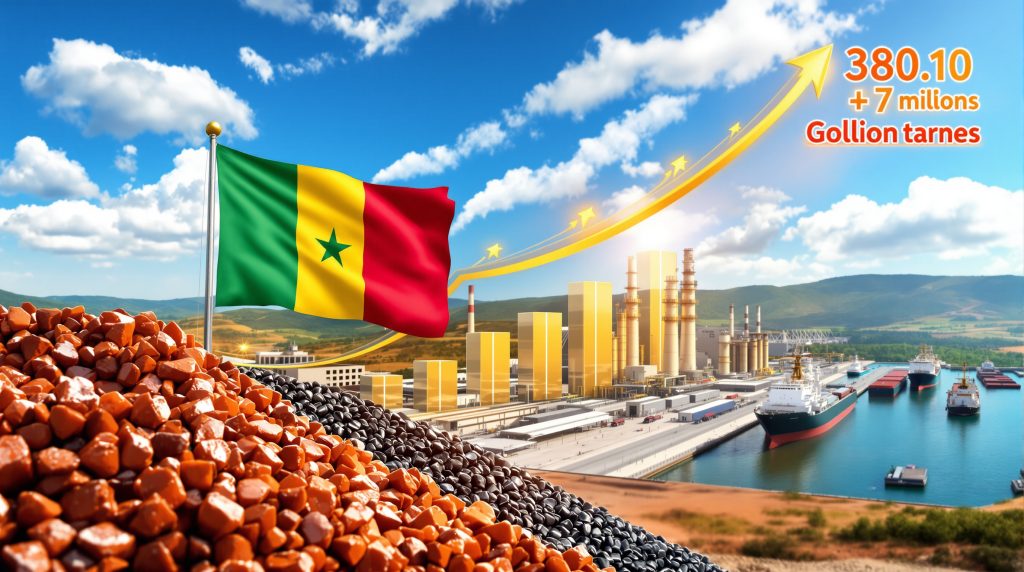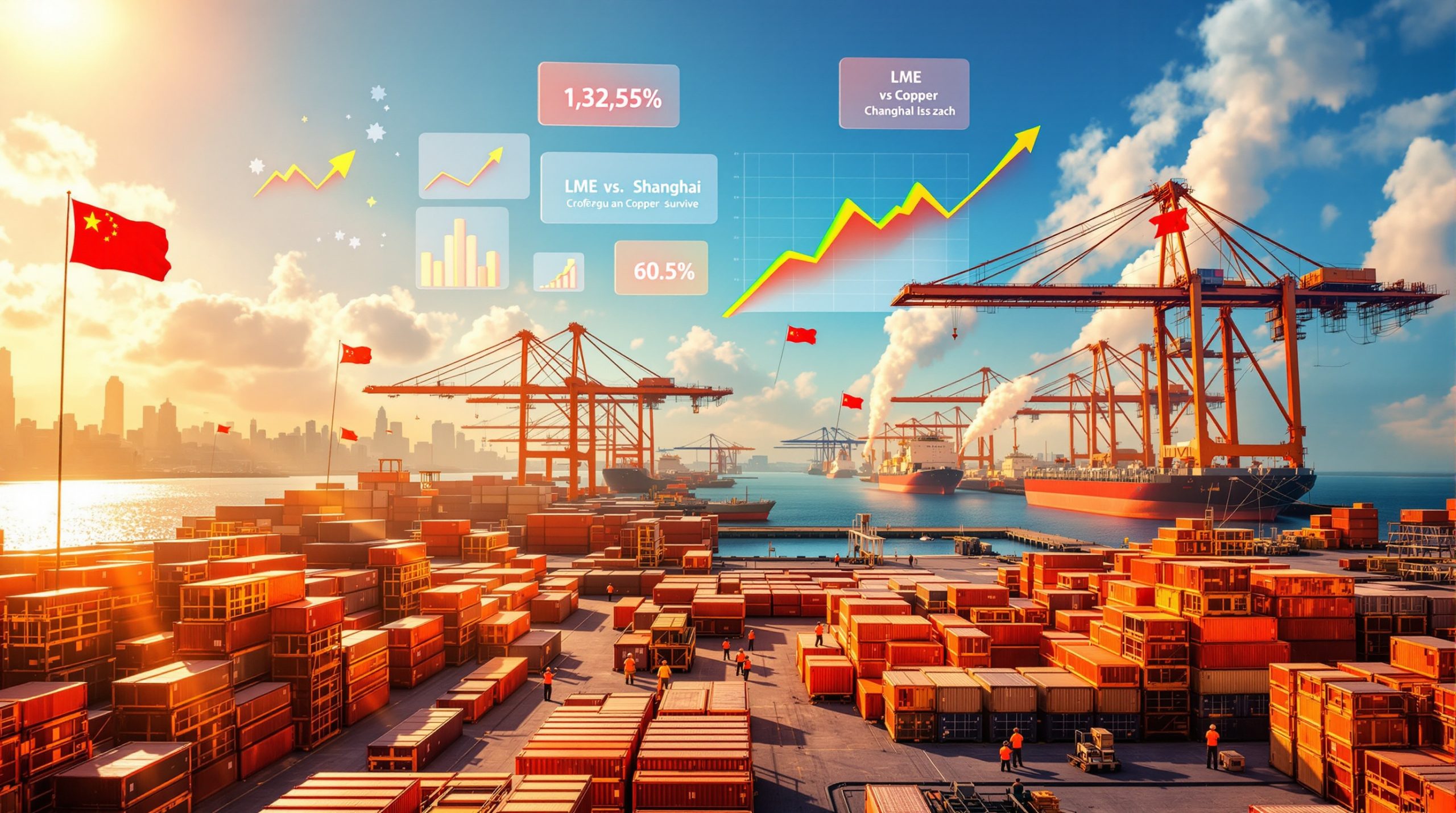Guinea's bauxite-rich landscape is undergoing a dramatic transformation as the West African nation prepares to end decades of raw mineral exports. The country's strategic pivot toward domestic processing represents more than policy adjustment – it signals a fundamental restructuring of how resource-rich nations can capture maximum value from their geological endowments. Furthermore, this initiative demonstrates how Guinea to fast-track alumina and iron ore processing reflects broader trends in mining industry evolution across Africa.
Strategic Enforcement Sets Guinea Apart from Previous African Processing Initiatives
Guinea's accelerated mineral processing development distinguishes itself through demonstrated enforcement capabilities rather than aspirational targets. The government's decisive action in August 2025, revoking Emirates Global Aluminium's bauxite concession after the company failed to construct promised refinery infrastructure, established a concrete precedent for processing mandate compliance.
This enforcement-backed approach coincides strategically with the Simandou iron ore project's operational launch, providing Guinea unprecedented leverage over international mining partners. The timing creates a compelling framework where processing requirements become contractual obligations with measurable consequences rather than voluntary commitments. Moreover, this approach differs significantly from other regional initiatives that have relied primarily on government intervention mining strategies without enforceable mechanisms.
Contractual Leverage Through Simandou Development
The massive Simandou iron ore development, beginning first shipments in November 2025, offers Guinea unique positioning to enforce domestic beneficiation requirements. Rio Tinto's Simandou project represents a significant milestone in the region's mining development. Mining partnerships now include specific processing obligations tied to concession maintenance, fundamentally altering the risk-reward calculation for international operators.
The government has established clear performance metrics tied to refinery construction timelines, creating accountability mechanisms absent from many previous African processing initiatives. This represents a evolution from regulatory suggestion to enforceable contractual commitment.
Demonstrated Regulatory Consequences
Emirates Global Aluminium's concession revocation demonstrates Guinea's willingness to enforce processing requirements through concrete action. Mines Minister Bouna Sylla emphasized the country's determination to move beyond its historical role as raw material supplier, stating the nation would no longer accept mining operations without corresponding domestic value-addition.
The revocation established clear precedent that processing agreements include performance obligations with defined consequences, differentiating Guinea's approach from regional initiatives that relied primarily on voluntary compliance frameworks.
Transformation Strategy: From Raw Exporter to Processing Hub
Guinea's processing transformation addresses a fundamental economic imbalance: despite being the world's largest bauxite producer, the nation operates zero domestic alumina refineries while shipping approximately 60% of production to China as feedstock. This dependency leaves Guinea vulnerable to commodity price volatility while capturing minimal value from its substantial mineral endowments.
Current Export Dependency Challenge
The scale of Guinea's export dependency illustrates both the opportunity and challenge facing domestic processing development. Current bauxite exports generate significantly lower revenue per unit compared to processed alumina, while one-third of Simandou iron ore production is destined for Chinese steel mills. These patterns reflect broader iron ore price trends affecting global markets.
This export concentration creates multiple vulnerabilities:
• Price-setting asymmetry where Chinese buyers maintain significant negotiating leverage
• Transportation cost burden absorbed by Guinea rather than distributed through value-chain integration
• Limited industrial capacity development constraining broader economic diversification
• Foreign exchange volatility exposure tied to raw commodity pricing fluctuations
Planned Alumina Processing Infrastructure Development
Guinea's systematic approach to alumina processing development centers on establishing 5-6 refineries by 2030, targeting approximately 7 million tonnes of annual processing capacity. The strategy prioritises partnerships with established technology providers to ensure operational expertise transfer alongside capital investment. This development strategy aligns with broader mineral beneficiation opportunities being pursued across Africa.
Guinea's Structured Alumina Development Timeline:
| Partner Company | Target Completion | Annual Capacity | Development Status |
|---|---|---|---|
| SPIC (China) | End-2027 | 3.3 million tonnes | Construction underway |
| Chinalco | Under negotiation | To be determined | Advanced discussions |
| Alteo (France) | Under negotiation | To be determined | Advanced discussions |
| CBG | Under negotiation | To be determined | Ongoing talks |
| Alcoa | Under negotiation | To be determined | Ongoing talks |
The SPIC project represents Guinea's first major alumina processing breakthrough, with construction currently progressing toward the end-2027 completion target. This facility will establish operational precedent and technical expertise foundation for subsequent refinery developments.
Iron Ore Processing Mandates for Simandou Partners
Rio Tinto and the Winning Consortium Simandou face specific processing requirements tied to their iron ore development rights. The partners must submit comprehensive feasibility studies by November 2027 for either a 500,000-tonne steel production facility or a 2-million-tonne pellet processing plant.
The government has structured these requirements with built-in enforcement mechanisms. If developers fail to meet feasibility study deadlines or demonstrate adequate processing commitment, Guinea can commission independent studies at the expense of Compagnie du Transguineen, the joint venture managing Simandou's transportation infrastructure.
This approach ensures processing requirements remain enforceable obligations rather than aspirational targets, creating concrete pathways for value-addition mandate implementation.
Economic Transformation Potential Through Domestic Processing
Guinea's processing strategy could generate substantial economic multiplier effects beyond direct facility operations. The transformation from raw material exports to value-added production creates opportunities for industrial employment development, supply chain integration, and reduced vulnerability to commodity price volatility.
Revenue Multiplication Through Value-Addition
Processing bauxite into alumina typically generates 3-4 times higher export revenue compared to raw ore sales, while iron ore pelletisation can increase value by 15-25% over unprocessed exports. These margins provide substantial economic justification for processing infrastructure investment, particularly given Guinea's ore quality advantages. The potential benefits mirror those observed in successful bauxite project benefits elsewhere globally.
The revenue multiplication extends beyond direct processing margins to include:
• Downstream supply chain development supporting equipment maintenance, transportation, and logistics services
• Technical expertise cultivation creating high-value employment in engineering, metallurgy, and plant operations
• Industrial infrastructure expansion benefiting power generation, port facilities, and transportation networks
• Foreign exchange stability through diversified export portfolio reducing commodity price exposure
Employment Creation and Industrial Capacity Building
World Bank analysis suggests domestic processing could transform Guinea's employment landscape by creating industrial jobs and reducing economic exposure to raw commodity price fluctuations. The processing facilities require skilled technical workers, creating opportunities for workforce development and technology transfer from international partners.
Each major refinery generates direct employment for plant operations while creating substantial indirect employment through:
- Supply chain services including equipment maintenance, spare parts supply, and transportation
- Technical support services covering engineering, environmental monitoring, and quality control
- Local procurement opportunities for construction materials, utilities, and general supplies
- Community service development supporting housing, healthcare, and educational infrastructure
Supply Chain Integration Advantages
Domestic processing repositions Guinea as a strategic supplier of refined materials rather than raw feedstock. This positioning enables direct relationships with global aluminium and steel manufacturers while reducing dependence on Chinese intermediary buyers who currently dominate Guinea's bauxite trade.
The integration creates opportunities for long-term offtake agreements with downstream manufacturers seeking secured supply chains for critical materials. These agreements typically offer more stable pricing and payment terms compared to spot market raw commodity sales.
Guinea's Bauxite Quality Advantages for Processing Operations
Guinea's bauxite deposits possess specific characteristics that make them particularly suited for efficient alumina processing. The ore's low silica content enables energy-efficient, low-temperature refining processes that reduce operational costs compared to high-silica alternatives.
Superior Metallurgical Characteristics
The Bayer Process, standard for alumina production worldwide, requires dissolution of bauxite in caustic soda at elevated temperatures. Guinea's low-silica ore composition offers several processing advantages:
• Reduced energy consumption through lower processing temperature requirements
• Lower caustic soda consumption per tonne of alumina produced
• Higher alumina recovery rates from each unit of bauxite feedstock
• Reduced waste generation minimising red mud storage and disposal costs
These metallurgical advantages translate directly into operational cost savings and improved profit margins for refinery operations, making Guinea-based processing facilities potentially more competitive than alternatives using lower-quality ore sources.
Global Market Positioning and Supply Chain Leverage
Guinea's bauxite reserves underpin approximately 25% of global aluminium production, providing substantial leverage in negotiating processing partnerships and securing project financing. This market position creates dependency relationships with major aluminium producers who require consistent, high-quality feedstock supply.
The country's Atlantic coast location offers competitive shipping advantages for processed materials destined for European and North American markets, potentially reducing transportation costs compared to Pacific-based alternatives.
Regional Context: Learning from African Processing Precedents
Guinea's processing initiative builds upon experiences from other mineral-rich African nations that have successfully implemented domestic beneficiation requirements. Mali's approach to gold processing and Nigeria's oil refining expansion provide instructive examples of policy frameworks and implementation strategies.
Comparative Regional Approaches
Several African countries have pursued domestic processing mandates with varying degrees of success. The common theme involves leveraging resource wealth to maximise economic returns while reducing dependence on raw material exports.
Guinea's approach incorporates lessons from regional precedents while addressing specific challenges related to bauxite and iron ore processing. The strategy emphasises partnership with established technology providers rather than attempting to develop processing capabilities independently.
Financing Innovation Through Islamic Finance Instruments
Guinea is exploring innovative financing mechanisms including Islamic finance instruments such as sukuks and sovereign fund partnerships to raise capital for processing infrastructure development. These approaches offer alternatives to traditional project finance while aligning with regional investment preferences.
Sukuk financing provides Shariah-compliant investment opportunities for Middle Eastern and Southeast Asian investors seeking exposure to African mineral processing projects. This financing diversity reduces dependence on traditional Western or Chinese funding sources.
Integrated Development Framework
Guinea's processing strategy extends beyond individual facility development to encompass broader infrastructure, financial sector, and human capital development over a 15-year horizon. This integrated approach recognises that successful processing operations require supporting infrastructure across multiple sectors.
The framework addresses power generation capacity, transportation infrastructure, technical education, and regulatory frameworks necessary to support large-scale industrial operations.
Implementation Challenges and Risk Factors
Guinea's ambitious processing targets face several implementation challenges that could affect timeline achievement and operational success. These challenges require proactive management to ensure processing development proceeds according to planned schedules.
Technical Expertise and Workforce Development
Establishing world-class alumina refineries requires specialised engineering knowledge and operational expertise that Guinea currently lacks domestically. International partnerships provide technology transfer opportunities, but effective knowledge absorption requires systematic workforce development programmes.
The technical requirements include:
• Process engineering expertise for refinery design, optimisation, and troubleshooting
• Maintenance capabilities for complex processing equipment and control systems
• Quality control systems ensuring refined products meet international specifications
• Environmental management addressing waste stream handling and emissions control
Infrastructure Development Prerequisites
Large-scale processing facilities require substantial supporting infrastructure that must be developed alongside refinery construction. Power generation capacity, water supply systems, and transportation networks require coordinated development to support processing operations.
Guinea's current infrastructure capacity may be insufficient to support multiple large-scale refineries operating simultaneously. The coordination of infrastructure development with processing facility construction represents a significant project management challenge.
Market Access and Dependency Considerations
While China's alumina projects in Guinea may reduce raw bauxite imports, experts note that exports will simply shift to alumina rather than eliminating Chinese market dependency entirely. As reported by Mining.com, Guinea must develop diverse buyer relationships to avoid replacing bauxite export dependence with alumina export concentration.
The challenge involves developing direct relationships with aluminium producers in Europe, North America, and other regions while maintaining competitive pricing against established suppliers.
Investment Timeline and Development Milestones
Guinea's processing development follows a structured timeline with specific milestones for different phases of implementation. Understanding these timelines helps investors and partners align their planning with government expectations and regulatory requirements.
Short-term Development Priorities (2025-2027)
The immediate focus centres on SPIC alumina refinery construction completion and Simandou processing feasibility study submissions. These near-term milestones establish operational precedents and regulatory compliance frameworks for subsequent developments.
Critical short-term milestones include:
• SPIC refinery construction completion by end-2027
• Simandou steel plant or pellet facility feasibility studies by November 2027
• Additional refinery partnership agreement finalisation with Chinalco and Alteo
• Infrastructure development coordination for power and transportation systems
Medium-term Expansion Targets (2027-2030)
The medium-term phase involves scaling operations to achieve the target of 5-6 operational alumina refineries with approximately 7 million tonnes of annual processing capacity. This phase requires coordinated facility construction, workforce development, and infrastructure expansion.
Success during this phase depends on lessons learned from initial SPIC operations and effective technology transfer from international partners. The timeline allows for iterative improvement based on early operational experience.
Long-term Vision and Strategic Positioning (2030+)
Guinea's long-term vision involves establishing itself as an integrated mineral processing hub serving regional and global markets. This positioning requires successful completion of initial processing facilities and development of supporting industrial ecosystems.
The long-term success depends on maintaining competitive cost structures, developing reliable supply chain relationships, and adapting to evolving global commodity market dynamics.
Investment Implications for Mining Sector Participants
Guinea to fast-track alumina and iron ore processing fundamentally alters the risk-reward profile for mining investment in the country. International companies must now factor domestic beneficiation obligations into project economics and feasibility assessments from initial development stages.
Enhanced Due Diligence Requirements
Mining companies operating in Guinea must conduct comprehensive due diligence that includes processing facility development costs, operational requirements, and long-term offtake arrangements. These factors significantly affect project capital requirements and return calculations.
The due diligence process must evaluate:
• Processing technology selection and capital expenditure requirements
• Operational expertise acquisition through partnership or internal development
• Market access strategies for processed product sales
• Regulatory compliance costs associated with processing mandate fulfilment
Strategic Partnership Evolution
Successful Guinea operations increasingly require strategic alliances with established processing technology providers and downstream manufacturers. These partnerships provide technical expertise while creating market access opportunities for processed products.
Partnership structures may involve joint ventures for processing facility development, technology licensing arrangements, or integrated supply agreements with downstream buyers. The optimal structure depends on each company's technical capabilities and market access requirements.
Capital Allocation and Return Optimisation
Processing requirements increase initial project capital needs but offer potential for higher long-term returns through value-added production. Companies must balance increased upfront investment against improved margins and reduced commodity price exposure.
The capital allocation requires careful analysis of processing economics, market demand for refined products, and competitive positioning against established processing centres in other regions.
What Does This Mean for Global Commodity Markets?
Guinea's accelerated processing development represents a significant shift in global alumina supply chain dynamics. As one of the world's largest bauxite producers transitions to value-added exports, downstream markets must adjust to new supplier relationships and pricing structures.
Consequently, the initiative demonstrates how resource-rich nations can leverage their geological advantages to capture greater economic value from mineral exports. However, successful implementation requires sustained commitment to infrastructure development, workforce training, and market diversification strategies.
Disclaimer: This analysis is based on publicly available information and industry observations. Mineral processing projects involve significant technical, regulatory, and market risks. Investors should conduct independent due diligence and consult with qualified advisors before making investment decisions. Processing facility development timelines and capacity targets represent current government plans that may be subject to revision based on market conditions and technical considerations.
Want to Capitalise on Africa's Mining Transformation?
Discovery Alert's proprietary Discovery IQ model delivers real-time alerts on significant mineral discoveries across the ASX, helping investors identify opportunities in companies with African operations before the broader market responds. Visit Discovery Alert's dedicated discoveries page to understand why historic mineral discoveries have generated substantial returns, then begin your 30-day free trial today to position yourself ahead of the market.




